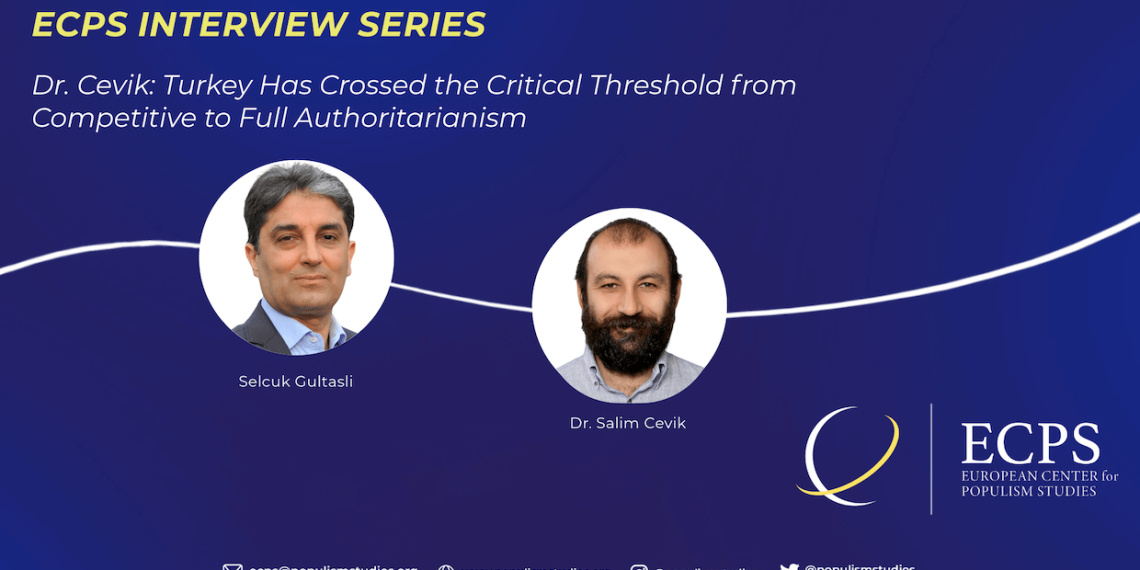In a compelling interview with ECPS, Dr. Salim Cevik argues that Turkey has “crossed the biggest threshold from competitive authoritarianism to full authoritarianism.” Highlighting the arrest of Ekrem Imamoglu, Dr. Cevik sees it as a targeted move to eliminate democratic competition: “He is being arrested because he could potentially defeat Erdogan.” Populism, once central to Erdogan’s rule, is giving way to raw coercion: “Force is the fundamental strategy of Erdogan.” Dr. Cevik also condemns Western silence, especially from Europe and the US, warning that their inaction amounts to complicity. “Erdogan feels very strong… because he has international backing.” Drawing a parallel with past mistakes on Putin, he cautions: “You can’t really trust a personal autocracy for strategic partnership.”
Interview by Selcuk Gultasli
In a wide-ranging and sobering interview with the European Center for Populism Studies (ECPS), Dr. Salim Cevik—Political Scientist and Researcher at the German Institute for International and Security Affairs—offers a critical diagnosis of Turkey’s deepening authoritarian turn under President Recep Tayyip Erdogan. Framing the recent arrest of Istanbul Mayor Ekrem Imamoglu as a pivotal moment in Turkey’s political trajectory, Dr. Cevik asserts that “we’ve crossed the biggest threshold from competitive authoritarianism to full authoritarianism.” While acknowledging that political repression is not new in Turkey, he emphasizes that this particular case marks a critical rupture because it directly targets “the most potent rival of Erdogan” and aims to eliminate any realistic possibility for the opposition to win an election.
Dr. Cevik situates this development within Erdogan’s long-standing strategy of personalizing power and dismantling institutional checks and balances. Over the course of two decades, Erdogan has “sidelined all important political figures,” absorbed the party into his persona, and gradually brought the judiciary, media, business sector, and civil society under his direct control. This personalization of rule has been “formalized” through the switch to a presidential system, which Dr. Cevik sees as a culmination of earlier informal power consolidations.
While Erdogan’s rule was long bolstered by a populist strategy that fused economic provision with religious-nationalist rhetoric, Dr. Cevik argues that this strategy is faltering. Erdogan is now “no longer the popular figure” he once was, as economic decline has eroded his legitimacy among even his core supporters. This, Dr. Cevik suggests, is what pushes the regime to rely increasingly on coercion rather than consent: “Populist mobilization is no longer the key term to understand Turkish authoritarianism… Force is the fundamental strategy of Erdogan.”
Of particular concern is the muted response from Western powers, which Dr. Cevik interprets as tacit approval. He criticizes both the United States and the European Union for enabling Erdogan’s autocratization, noting that “Erdogan feels both very weak because he’s losing popular legitimacy, but he’s also feeling very strong… because he has international backing.” In Europe, especially, strategic interests tied to Turkey’s military capacity and geopolitical location have led to a dangerous silence. “Europe made the same mistake with Putin,” Dr. Cevik warns. “I see no reason why Erdogan should be trusted more than Putin… It’s not only normatively and morally wrong—it’s also strategically blind thinking.”
In this critical conversation, Dr. Cevik calls attention not only to Turkey’s alarming democratic backsliding but also to the global implications of Western complacency in the face of authoritarian consolidation.


